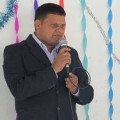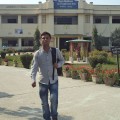As ELT Choutari enters into eighth year, Choutari editor Ashok Raj Khati has talked to Dr. Balkrishna Sharma, Narendra Singh Dhami, Praveen Kumar Yadav and Dr. Shyam Sharma, to reflect back its seven years journey. They have put their voices in light with the contribution of ELT Choutari to local and global ELT discourses too.
Dr. Bal Krishna Sharma, a founding member of Choutari
 I would like to comment mainly on two points when reflecting back the Choutari’s seven years. First, Choutari has been able to groom a new generation of scholars capable of writing on topics they have read about in others contexts or learned in their university classrooms. We did not have a stronger tradition of academic writing in TESOL and applied linguistics in the context of Nepal in the past. The Journal of NELTA was there, but young Nepali scholars did not consider themselves qualified enough to write for the journal. I had a similar view when I completed my M. Ed. In 2003. There still is a popular assumption that only experienced ‘scholars’ write for the journal, and the younger scholars are positioned in the receiving end of the journal readership. Since the starting of this webzine, this assumption has been questioned, renegotiated and redefined. I can see a whole lot of new scholars turning themselves into academic writers with greater confidence, refined skills, and thoughtful pedagogical tips. Second, the traditional mode of printing and publication in Nepal reached only to a small group of readers, usually with a long time gap. Consider, for example, the NELTA journal we have. It includes a collection of homegrown scholarship, but we have to wait for one year to read about ten or so articles. Webzine like the ELT Choutari has again challenged the tradition, expanding its reach to a wider audience, with a large number of readable articles. This again has promoted a new generation of writers and readers, who necessarily are not the university professors.
I would like to comment mainly on two points when reflecting back the Choutari’s seven years. First, Choutari has been able to groom a new generation of scholars capable of writing on topics they have read about in others contexts or learned in their university classrooms. We did not have a stronger tradition of academic writing in TESOL and applied linguistics in the context of Nepal in the past. The Journal of NELTA was there, but young Nepali scholars did not consider themselves qualified enough to write for the journal. I had a similar view when I completed my M. Ed. In 2003. There still is a popular assumption that only experienced ‘scholars’ write for the journal, and the younger scholars are positioned in the receiving end of the journal readership. Since the starting of this webzine, this assumption has been questioned, renegotiated and redefined. I can see a whole lot of new scholars turning themselves into academic writers with greater confidence, refined skills, and thoughtful pedagogical tips. Second, the traditional mode of printing and publication in Nepal reached only to a small group of readers, usually with a long time gap. Consider, for example, the NELTA journal we have. It includes a collection of homegrown scholarship, but we have to wait for one year to read about ten or so articles. Webzine like the ELT Choutari has again challenged the tradition, expanding its reach to a wider audience, with a large number of readable articles. This again has promoted a new generation of writers and readers, who necessarily are not the university professors.
Regarding the contribution of Choutari, I was reading the latest issue of Choutari before I wrote this paragraph. This issue largely reflects how Choutari has been able to address both local and global concerns in the field of ELT. Lal Bahadur Bohara, for example, brings voices of English teachers from the far-western region. I was intrigued by Lal Bahadur’s observation that teachers in the region do not only question the Western decontextualized cultural content in English lessons, they also question the so called ‘localized’ content in textbooks and contents written and produced by Nepali writers. This article reminds me of an onion metaphor used in language policy research, highlighting that language policy is like an onion reconciled in several layers, processes and levels. So is the issue of culture: it operates in multiple levels, and national dominant cultures may not serve as a local culture in all the contexts. Lal Bahadur’s blog post is one representative examples from Choutari with regard to how Nepali young scholars have tried to raise and redefine the ‘local’ in language teaching, questioning and challenging some dominant traditions in our field.
Another article from the same issue that connects the local with the global is by Sujit Wasti. Sujit aptly uses the metaphor of McDonaldization by sociologist George Ritzer to take account of the impact of globalization on the local, including language and the environment. This was fascinating for me because ELT has not paid much attention to the discourses and concerns of the environment in pedagogical contexts. It makes sense to address the concerns of climate change and environmental degradation, which are equally local and global, in our policies and practices.
When the local voices and issues are narrated and circulated to a global audience through the internet on ELT topics that matter to people around the world (e.g. critical pedagogy, teaching tips, ELT humor, literacy, and many more), this is as an evidence that Choutari is both local and global.
Narendra Singh Dhami, teacher at Khimti Project school, Kirne, Dolkha

I have been reading the Choutari Khurak since its first issue published in 2009. I found that the blog posts are very useful resources for me and my fellow teachers. As its name suggests, it offers different tastes and colours on teaching strategies and activities as well as theoretical insights for professional development.
We have formed a group of five teachers in our school to discuss on the posts of each new issue of ELT Choutari. We often save the published articles from the website and discuss on each post among us. We also apply the best strategies and current trends of ELT approaches mentioned in our real classroom teaching situation. Some articles are truly inspirational, some are insightful to new teaching strategies and some are really research based too. The Choutari teaches us on how to grow professionally in the remote parts of the country. And, of course, Choutari has broadened the horizon of ELT discourses in such remote area where it is quite difficult to get textbooks in time. The varieties of posts in each issue of Choutari always reenergize me to improve my teaching practices. I shall be much glad to read some posts on child psychology and motivational stories in the days to come. I am so grateful to the editorial board for providing me an opportunity to reflect on ELT Choutari.
Praveen Kumar Yadav, an editor of Choutari
 As ELT Choutari enters into 8th year, we would like to thank our valued contributors and readers for their continued support. The ELT journey without their support was never possible to accomplish seven years. The ELT Choutari today has won acclaim for its commitment to contributing to discourses focused on various issues related to English Language Teaching and Education.
As ELT Choutari enters into 8th year, we would like to thank our valued contributors and readers for their continued support. The ELT journey without their support was never possible to accomplish seven years. The ELT Choutari today has won acclaim for its commitment to contributing to discourses focused on various issues related to English Language Teaching and Education.
Generally speaking, the past causes the present, and so the future. Looking into the origin of Choutari, the web magazine was started as a wiki collaborative project in January 2009 to supplement the ELT conversations that have been going on for many years within the mailing list of NELTA. In order to make accessible to such ELT conversation by the rest of the ELT community outside NELTA (here’s what one member wrote in the original “about” page), ELT Choutari was initiated.
First initiated by Ghanashyam Sharma (Shyam), who was accompanied by Bal Krishna Sharma and Prem Bahadur Phyak, this networking initiative had six core moderators (Sajan Kumar Karn, Kamal Poudel, and Hem Raj Kafle joined later) from 2009-2012. Then, this initiative is being continued by a team of young ELT practitioners and scholars. They believe that we can develop very useful and probably most relevant intellectual/professional resources for the Nepalese ELT community and those interested through a discussion forum like this.
So far, more than 500 posts has been published by ELT Choutari, followed by more than 1000 comments over the past seven years. Our journey over the past seven years did not remain smooth. Our journey began with challenges, continued with the same and they exist even today. For instance, in the beginning of our journey we embraced challenges when internet and blogging was much exposed in Nepal and ELT community. Even today, challenges are ahead as we look for ELT enthusiasts to come and joins us for the mission.
Amid challenges, we chose to remain optimist to see them as the opportunity for us, just like Winston S. Churchill’s saying, “A pessimist sees the difficulty in every opportunity; an optimist sees the opportunity in every difficulty.” We are driven by our courage and willingness to change. We never pretend that nothing has happened or we are not ready to move ahead.
Dr. Shyam Sharma, a founding member of Choutari
 I think Choutari has made unique contributions to Nepali ELT discourse. The community had a great journal, and we also had an active listserv; but we wanted to provide colleagues a place to share ideas that was more public/open and interactive, where especially younger colleagues could contribute their ideas and experiences and run conversations. Many scholars who chose to run this blogzine also had the opportunity to practice publication and leadership skills while serving the profession. This publication has slowed down a little bit, but I am confident that new scholars will take the baton forward. In fact, I also hope that more venues like this will emerge and make new kinds of contributions to the field of ELT in Nepal.
I think Choutari has made unique contributions to Nepali ELT discourse. The community had a great journal, and we also had an active listserv; but we wanted to provide colleagues a place to share ideas that was more public/open and interactive, where especially younger colleagues could contribute their ideas and experiences and run conversations. Many scholars who chose to run this blogzine also had the opportunity to practice publication and leadership skills while serving the profession. This publication has slowed down a little bit, but I am confident that new scholars will take the baton forward. In fact, I also hope that more venues like this will emerge and make new kinds of contributions to the field of ELT in Nepal.
The few colleagues who started this journey would have never imagined that hundreds of scholars, including scholars from around the world, would contribute to this venue–nor that new local voices would join and develop like they did. Thinking about how we started the initial conversation (by putting some of our email conversations in the more open platform of a wiki) is just humbling. The first set of editors (Prem Phyak, Bal Krishna Sharma, and me) took a few important steps in the journey, but we never imagined the many new areas that new colleagues would go on to cover, new ideas they would implement. Just the number of posts and comments and the generation of ELT scholars at home who have participated in the conversation through Choutari is truly inspiring.
As a reader, I urge other readers to read and share the good work here, to contribute as writers, and to consider leading the venue. And I thank the colleagues who are running it today and tomorrow.